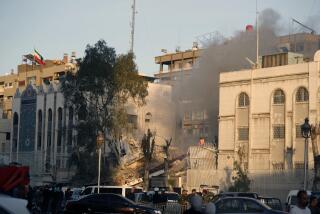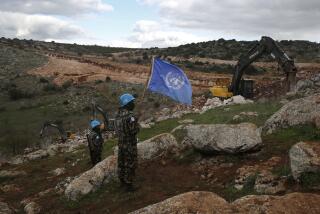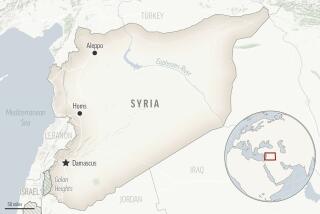Bombing on Syria border may have targeted opposition leader
BEIRUT — A minibus explosion at a crossing on the Turkish-Syrian border killed more than a dozen people Monday, and some activists said its target might have been one of the leading figures in the Syrian opposition.
The blast struck the Turkish side of the border minutes after George Sabra, vice president of the Syrian National Coalition, passed through, several opposition activists said. Sabra was returning to Turkey after a trip to the city of Aleppo, in nearby Idlib province, said opposition activist Ahmad Aasi.
The Bab Hawa border crossing has for months been controlled by forces who oppose the government of President Bashar Assad and has been a main artery for refugees fleeing the country and for aid and weapons entering Syria.
Turkey’s semiofficial Anatolian news agency reported that the minibus, which had Syrian license plates, was laden with powerful explosives.
No one had taken responsibility for the blast by late Monday. A pro-Syrian government group reported that the attack was carried out by members of Syrian intelligence, which planted explosives in a truck carrying ammunition to the country. The group said that dozens of “terrorists” were killed in the blast. The Syrian government refers to all opposition figures as terrorists.
In and around Damascus, the Syrian capital, fierce clashes continued between Free Syrian Army rebel forces and government troops. Much of the fighting remained concentrated around the strategic northeastern suburb of Jobar, which, if controlled by rebels, could cut off government forces in the capital from central and northern provinces, said opposition activist Abu Yazen.
Government troops also moved tanks into Abaseen Square to hold off a rebel advance into the capital. Abu Yazen said the goal of the fighting, which began Wednesday when rebels attacked several checkpoints, was to strike military sites around Damascus.
Meanwhile, in Raqqah province in the north, rebels seized an important dam on the Euphrates River and parts of the nearby city of Tabqa, according to the Syrian Observatory for Human Rights, an antigovernment group.
Moaz Khatib, head of the Syrian National Coalition, the main opposition umbrella group, said he had not withdrawn his offer for negotiations with the Assad government.
The regime has yet to respond formally to the offer, Khatib told reporters in Cairo, where he is based.
“All that we have heard is general talk that, unfortunately, the regime has been repeating for two years,” Khatib said.
The opposition leader has made a qualified offer for direct talks with Syrian authorities if the government meets two conditions: the release of tens of thousands of prisoners and the renewal of passports of Syrian expatriates abroad.
The offer was widely regarded as a concession because opposition leaders had long insisted that Assad must be out of power before any talks could occur. Some opposition factions still reject the idea of negotiating with Assad’s government and have denounced Khatib’s offer.
Syrian officials have said they are open to “dialogue” with the opposition but without preconditions. But the government has also generally ruled out talks with those they call terrorists and their political representatives.
Special correspondent Nabih Bulos contributed to this report.
More to Read
Start your day right
Sign up for Essential California for news, features and recommendations from the L.A. Times and beyond in your inbox six days a week.
You may occasionally receive promotional content from the Los Angeles Times.






